Top Rankings
Thompson 61 School District ranks among the top 20% of public school district in North Dakota for:
Category
Attribute
Reading/Language Arts Proficiency
Highest reading/language arts proficiency (Top 10%)
Graduation Rate
Highest graduation rate (Top 5%)
Community Size
Largest student body (number of students) (Top 1%)
For the 2025 school year, there are 2 public schools serving 672 students in Thompson 61 School District. This district's average testing ranking is 8/10, which is in the top 30% of public schools in North Dakota.
Public Schools in Thompson 61 School District have an average math proficiency score of 43% (versus the North Dakota public school average of 39%), and reading proficiency score of 59% (versus the 44% statewide average).
Minority enrollment is 6% of the student body (majority Hispanic), which is less than the North Dakota public school average of 29% (majority American Indian and Hispanic).
Overview
This School District
This State (ND)
# Schools
2 Schools
537 Schools
# Students
672 Students
122,294 Students
# Teachers
47 Teachers
9,926 Teachers
Student : Teacher Ratio
14:1
14:1
District Rank
Thompson 61 School District, which is ranked within the top 30% of all 167 school districts in North Dakota (based off of combined math and reading proficiency testing data) for the 2021-2022 school year.
The school district's graduation rate of 90% has increased from 80% over five school years.
Overall District Rank
#34 out of 169 school districts
(Top 30%)
(Top 30%)
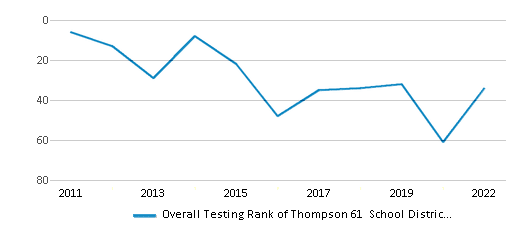
Math Test Scores (% Proficient)
44%
39%
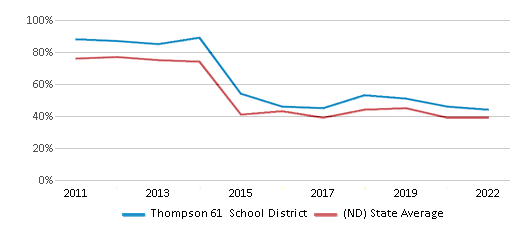
Reading/Language Arts Test Scores (% Proficient)
57%
44%
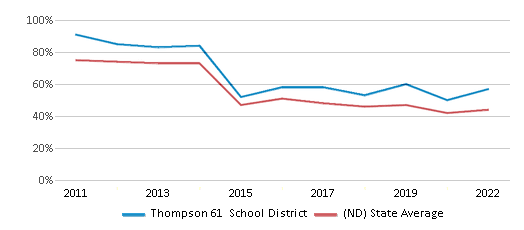
Science Test Scores (% Proficient)
50-54%
44%
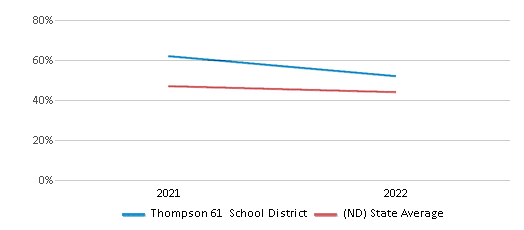
Graduation Rate
≥90%
85%
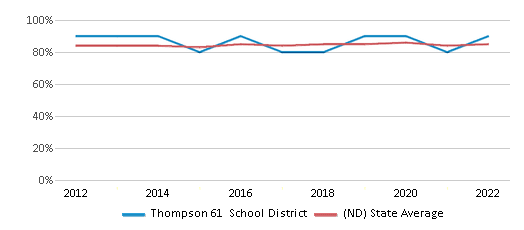
Students by Ethnicity:
Diversity Score
0.11
0.48
# American Indian Students
2 Students
13,083 Students
% American Indian Students
n/a
11%
# Asian Students
n/a
1,750 Students
% Asian Students
n/a
1%
# Hispanic Students
11 Students
8,341 Students
% Hispanic Students
2%
7%
# Black Students
5 Students
6,529 Students
% Black Students
1%
5%
# White Students
634 Students
86,623 Students
% White Students
94%
71%
# Hawaiian Students
n/a
374 Students
% Hawaiian Students
n/a
n/a
# Two or more races Students
20 Students
5,594 Students
% of Two or more races Students
3%
5%
Students by Grade:
# Students in PK Grade:
4
3,099
# Students in K Grade:
58
8,897
# Students in 1st Grade:
64
9,525
# Students in 2nd Grade:
53
9,752
# Students in 3rd Grade:
68
9,340
# Students in 4th Grade:
57
9,408
# Students in 5th Grade:
50
9,314
# Students in 6th Grade:
58
9,461
# Students in 7th Grade:
47
9,001
# Students in 8th Grade:
45
9,080
# Students in 9th Grade:
48
9,428
# Students in 10th Grade:
46
9,162
# Students in 11th Grade:
38
8,623
# Students in 12th Grade:
36
8,204
# Ungraded Students:
-
-
District Revenue and Spending
The revenue/student of $12,122 in this school district is less than the state median of $17,615. The school district revenue/student has declined by 9% over four school years.
The school district's spending/student of $10,999 is less than the state median of $17,617. The school district spending/student has declined by 9% over four school years.
Total Revenue
$8 MM
$2,154 MM
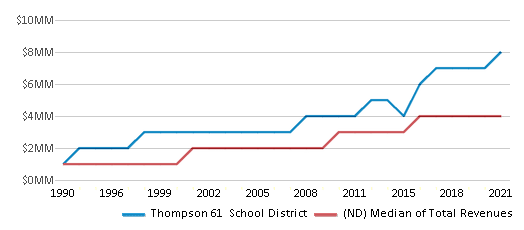
Spending
$7 MM
$2,154 MM
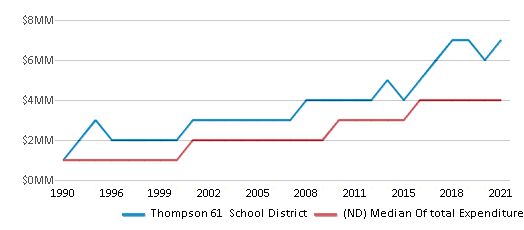
Revenue / Student
$12,122
$17,615
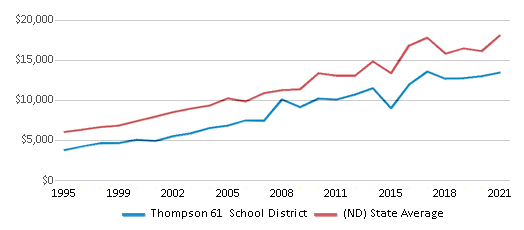
Spending / Student
$10,999
$17,617
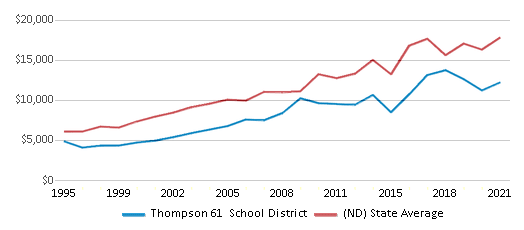
Best Thompson 61 School District Public Schools (2025)
School
(Math and Reading Proficiency)
(Math and Reading Proficiency)
Location
Grades
Students
Rank: #11.
Thompson Elementary School
(Math: 50-54% | Reading: 55-59%)
Rank:
Rank:
10/
Top 10%10
424 3rd St
Thompson, ND 58278
(701) 599-2765
Thompson, ND 58278
(701) 599-2765
Grades: PK-6
| 412 students
Rank: #22.
Thompson High School
(Math: 30-34% | Reading: 60-64%)
Rank:
Rank:
6/
Top 50%10
424 3rd St
Thompson, ND 58278
(701) 599-2765
Thompson, ND 58278
(701) 599-2765
Grades: 7-12
| 260 students
Frequently Asked Questions
How many schools belong to Thompson 61 School District?
Thompson 61 School District manages 2 public schools serving 672 students.
What is the rank of Thompson 61 School District?
Thompson 61 School District is ranked #40 out of 167 school districts in North Dakota (top 30%) based off of combined math and reading proficiency testing data for the 2021-2022 school year. This district ranks in the top 20% of North Dakota school districts for: Highest reading/language arts proficiency (Top 10%), Highest graduation rate (Top 5%) and Largest student body (number of students) (Top 1%)
What is the racial composition of students in Thompson 61 School District?
94% of Thompson 61 School District students are White, 3% of students are Two or more races, 2% of students are Hispanic, and 1% of students are Black.
What is the student/teacher ratio of Thompson 61 School District?
Thompson 61 School District has a student/teacher ratio of 14:1, which is higher than the North Dakota state average of 12:1.
What is Thompson 61 School District's spending/student ratio?
The school district's spending/student of $10,999 is less than the state median of $17,617. The school district spending/student has declined by 9% over four school years.
Recent Articles

What Is A Charter School?
Explore the world of charter schools in this comprehensive guide. Learn about their history, how they operate, and the pros and cons of this educational innovation. Discover key facts about charter schools, including admission policies, demographics, and funding, as well as what to look for when considering a charter school for your child.

10 Reasons Why High School Sports Benefit Students
Discover the 10 compelling reasons why high school sports are beneficial for students. This comprehensive article explores how athletics enhance academic performance, foster personal growth, and develop crucial life skills. From improved fitness and time management to leadership development and community representation, learn why participating in high school sports can be a game-changer for students' overall success and well-being.

February 05, 2025
Understanding the U.S. Department of Education: Structure, Impact, and EvolutionWe explore how the Department of Education shapes American education, from its cabinet-level leadership to its impact on millions of students, written for general audiences seeking clarity on this vital institution.





